|
|
|
Sort Order |
|
|
|
Items / Page
|
|
|
|
|
|
|
| Srl | Item |
| 1 |
ID:
078790
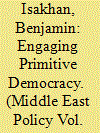

|
|
|
| 2 |
ID:
172197
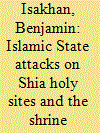

|
|
|
|
|
| Summary/Abstract |
After conquering large swaths of Syria and Iraq, the IS undertook an aggressive sectarian campaign in which they not only enacted horrific violence against the Shia people, but also damaged or destroyed several key Shia mosques and shrines. Drawing on Social Movement Theory (SMT), this article analyzes the response by various Shia non-state actors—militia leaders, religious clergymen, populist preachers, and seminal poets. It argues that they used the IS threat to Shia holy sites to develop and deploy a mobilization frame that has come to be referred to as the “shrine protection narrative.” The article also documents the manifold consequences of the shrine protection narrative: it underpinned a mass recruitment drive that saw tens of thousands enlist; it legitimized foreign Shia militias to enter the conflicts in both Syria and Iraq; it justified the formation of entirely new militias who declared the centrality of shrine protection to their mandate; and it mobilized them to enact political violence. In doing so, this article extends existing studies of SMT to demonstrate that “sacred spaces”—and particularly the need to protect religious sites from specific threats—can serve as a powerful mobilization frame towards political violence.
|
|
|
|
|
|
|
|
|
|
|
|
|
|
|
|
| 3 |
ID:
188708
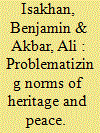

|
|
|
|
|
| Summary/Abstract |
The destruction of heritage in conflict has emerged as a key challenge to global security and the prospects of peace. In response to the deliberate targeting of heritage sites by the Islamic State (IS) and other actors in recent years, the international community has launched a number of initiatives designed to protect and reconstruct key heritage sites in complex (post-)conflict contexts. However, this article demonstrates that such initiatives are often underpinned by the norm that the protection of heritage in conflict can serve to enhance the prospects of reconciliation, stability and peace. This article problematizes this norm by focussing on the case study of Shia responses to the targeting of their religious heritage sites by the IS in Iraq from mid-2014. It documents the ways that key Shia leaders instrumentalized the case of protecting heritage not to advance peace and security, but to create entirely new militias, to recruit thousands of Shia faithful, to mobilize them to fight against the IS, and to engage in violence and human rights abuses. This raises significant concerns about whether the promotion of heritage as a pathway to peace could inadvertently exacerbate conflict and lead to renewed waves of violence and heritage destruction.
|
|
|
|
|
|
|
|
|
|
|
|
|
|
|
|
| 4 |
ID:
176555
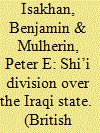

|
|
|
|
|
| Summary/Abstract |
This article traces the evolving political platform of one of Iraq’s oldest and most powerful Shi’i political parties, the Islamic Supreme Council of Iraq (ISCI). Drawing on an analysis of 15 years of primary materials produced by ISCI, it focuses principally on their promotion of decentralization as a path towards peace and stability in Iraq. However, the article also traces the origins of a deep schism that emerged within ISCI between the movement’s old guard who were beholden to the Iranian regime and their model of vilāyat-i faqīh, and the youth-led Iraqi nationalist faction who wanted to see the instalment of a civil government without religious oversight. The article demonstrates that this division is indicative of a theological debate between Shi’i religious scholars over differing interpretations of the role of Shi’ism in politics. The article concludes by arguing that understanding the extent to which such esoteric religious debates manifest themselves politically is crucial to interpreting divisions within Shi’ism not just in Iraq, but across the broader Middle East.
|
|
|
|
|
|
|
|
|
|
|
|
|
|
|
|
| 5 |
ID:
174565
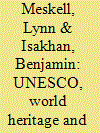

|
|
|
|
|
| Summary/Abstract |
Since March 2015, the Saudi-led military intervention in Yemen has had devastating consequences for the country, its people and its rich cultural heritage. This article traces the responses of the world’s foremost multilateral body concerned with heritage promotion and protection, the United Nations Educational, Scientific and Cultural Organization (UNESCO). Drawing on extensive interviews, archival research and long-term ethnographic research on UNESCO itself and, more specifically, its responses to the war in Yemen, it documents UNESCO’s profound failures in protecting Yemen’s heritage and in confronting the Saudi-led coalition. To do so, the article utilises the framework of ‘gridlock’ to analyse how and why multilateral bodies such as UNESCO become hamstrung in confronting powerful member states in conflict. The article concludes by arguing that UNESCO’s failures in Yemen hold powerful lessons about the role of multilateral institutions in addressing conflict.
|
|
|
|
|
|
|
|
|
|
|
|
|
|
|
|
|
|
|
|
|